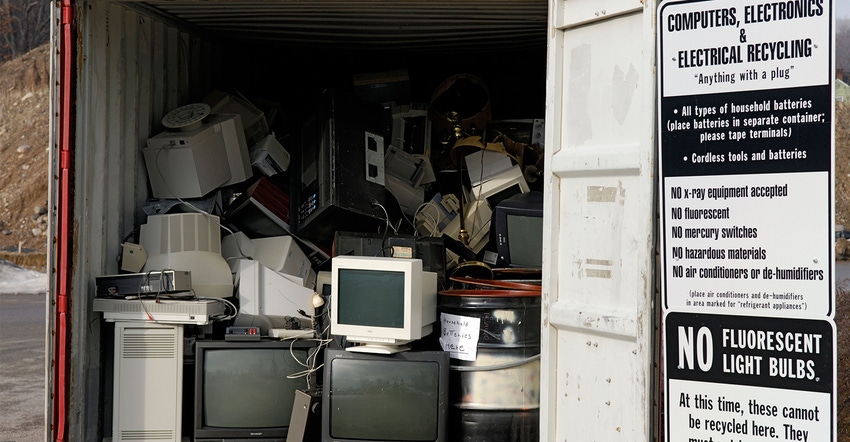Right to Repair Wins in California With U.S. Proposal in the Works
California has passed the Right to Repair Act (SB-244), legislation that mandates electronics manufacturers to provide parts, tools, and guides to third-party repair shops and the public, potentially boosting business for repair services and addressing the growing e-waste problem.

California has passed legislation that will drive a major shift in how original equipment manufacturers (OEMs) of electronics can do business in the Gold Coast state. At the same time, the new law, dubbed as California’s Right to Repair Act (SB-244), could bring a windfall of business to electronics refurbishers while potentially helping ease a growing e-waste problem.
Under SB-244, manufacturers will have to provide the same parts, tools, and guides to third-party repair shops and the public as provided to their authorized repair network. Until now, independent shops couldn’t get ahold of parts, or even specialty screwdrivers, to work on products coming through their doors.
SB-244 applies to digital electronics with a wholesale price over $100 that are manufactured and sold in California on or after July 1, 2021, effective July 1, 2024. And it applies to devices with a wholesale price in the $50 to $99 range that date back to July 1, 2017. Provisions are also built in for appliances, such as refrigerators, dishwashers, stoves, and televisions.
Moving the landmark bill forward meant stepping into an aggressive lobbying arena, with proponents taking on the country’s largest tech companies on home turf to Silicone Valley.
“We couldn’t even get a hearing the first few years, and, with a couple exceptions, the industry largely refused to even come to the negotiating table,” says Nick Lapis, director of Advocacy, Californians Against Waste (CAW). The environmental nonprofit co-sponsored the legislation along with CALPIRG and iFixit, which was introduced by Senator Susan Eggman in 2018.
“This is a common sense bill that will help small repair shops, give choice to consumers, and protect the environment,” Eggman said in a statement.
Digital tech giant Apple who long led the fight against the policy recently changed its position, and went a step further in October, announcing plans to voluntarily implement right to repair nationally and to back federal legislation. Apple said in a statement that SB-244 balances the priorities of “consumer choice and reliable repairs” while protecting privacy, data security, and manufacturers’ intellectual property.
On the heels of Apple’s statement, HP, who also contested the California legislation for years, announced it stands behind the finalized bill.
“HP supports repairability of our products. We believe in collaborating with lawmakers on mutually agreeable resolutions that ensure product integrity, data security, and the best environmental practices," an HP spokesperson wrote to Waste360.
Among dozens of proponents are Zero Waste USA, Homeboy Electronics Recycling, and California Product Stewardship Council, as well as several jurisdictions who anticipate it will help curb a massive influx of e-waste they struggle to keep afloat of.
CALPIRG, Californians Against Waste, and iFixit wrote: “When only the manufacturer or their authorized technician can fix something, they can charge whatever they want or claim that it can’t be fixed, to push consumers into buying new devices, leading to more waste.”
The Association of Home Appliance Manufacturers, California Chamber of Commerce, and others have a different view. They argue that while manufacturers will not be required to divulge trade secrets, “except as may be necessary to comply with the bill’s provisions,” SB-244 does not provide enough protection. It places consumers and their data at risk and undermines California companies that are part of OEM-authorized networks, they argue.
Joe Marion, president, ASCDI - The ITAD Association, sees California’s law as a step in the right direction but believes such policies should go further, pointing out for example that manufacturers should be required to supply parts, tools, and diagnostics for 10 years from manufacture. (California’s law applies for three to seven years, depending on price.) Marion’s rational is that a product’s first life typically runs from three to five years, with potential to remain in circulation for about five more years.
Lapis points to what the policy could mean for more than the repair and manufacturing industries.
“[Supporting] repair and secondhand sales will help make technology available for folks who don’t have the resources to buy the latest and greatest consumer electronics. These devices are a digital lifeline for people and are increasingly becoming indispensable as everything from healthcare to education to basic government services goes online.”
Lapis believes SB-244 could have impact beyond his home state as decision makers look to California for an example.
“If California were its own country, it would have the fourth largest economy in the world, larger than the U.K., Germany, or France. What we do here matters. It matters in and of itself. But it also matters around the country and on the global stage,” he says.
Right to repair legislation has been introduced in more than 25 states and most recently in Congress under The Fair Repair Act.
About the Author(s)
You May Also Like




